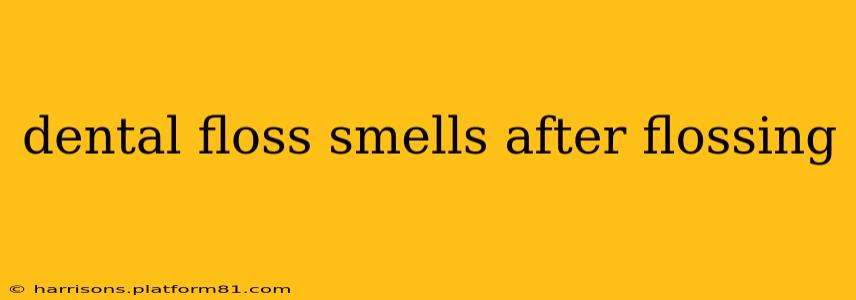Many people diligently floss their teeth, only to be met with an unpleasant surprise: a foul odor emanating from the floss itself. This isn't necessarily a sign of poor oral hygiene, though it can be an indicator of underlying issues. Let's delve into the reasons why your dental floss might smell after flossing and what you can do about it.
What Causes the Smell?
The smell you notice on your floss after flossing is usually due to bacteria and food particles trapped between your teeth. These particles decompose, creating volatile sulfur compounds (VSCs), the primary culprits behind bad breath and that unpleasant floss odor. The tighter the spaces between your teeth, the more likely it is that food will get trapped and contribute to the smell.
Is it a Sign of Poor Oral Hygiene?
While a smelly floss can indicate a need for improved oral hygiene, it isn't always the case. Even with meticulous brushing and flossing, some individuals may experience this issue due to the natural anatomy of their teeth and gums. However, consistently smelly floss can suggest you need to up your oral hygiene game.
How Can I Prevent My Floss from Smelling?
Here are several strategies to combat that unpleasant smell:
- Floss More Frequently: Daily flossing is crucial, but some people benefit from flossing twice a day, especially after meals. This removes food particles before they have a chance to decompose.
- Use a Different Type of Floss: Experiment with different floss types. Waxed floss can sometimes glide more easily between teeth, removing particles more effectively than unwaxed floss. Consider trying floss picks, which can be easier to handle for some people.
- Improve Brushing Technique: Ensure you're brushing thoroughly for at least two minutes, twice a day, using a fluoride toothpaste. Proper brushing dislodges food particles and helps remove plaque before it can contribute to odor.
- Use Mouthwash: A therapeutic mouthwash can help neutralize bacteria and reduce bad breath, thus potentially reducing the odor on your floss.
- See Your Dentist: If you continue to experience smelly floss despite improved oral hygiene, schedule an appointment with your dentist. They can check for any underlying dental issues, such as gum disease (gingivitis or periodontitis), cavities, or other problems that might be contributing to the odor.
Does the Smell Indicate Gum Disease?
While smelly floss isn't a definitive diagnosis of gum disease, it can be a warning sign. Gum disease is characterized by inflammation and infection of the gums, often leading to bad breath and an increased accumulation of bacteria. If you notice persistent bad breath, bleeding gums, or red, swollen gums in addition to smelly floss, it's crucial to see your dentist promptly.
What If I Only Floss Occasionally and My Floss Smells?
If you only floss occasionally and your floss smells, it’s a clear indication that you need to floss more regularly. The smell is directly related to the buildup of food particles and bacteria between your teeth. The longer these particles remain, the more they decompose and the stronger the odor becomes. Making flossing a daily habit is essential for maintaining good oral hygiene.
My Floss Smells Even After Thorough Cleaning—What Should I Do?
If you’ve implemented all the above suggestions and your floss still smells, a visit to your dentist is recommended. They can perform a thorough examination to rule out any underlying dental problems contributing to the persistent odor. This could include identifying and treating cavities, gum disease, or other oral health issues.
Remember, maintaining good oral hygiene is crucial for overall health. If you’re concerned about the smell of your floss, addressing the issue proactively is always the best approach. Don't hesitate to reach out to your dental professional for guidance.
